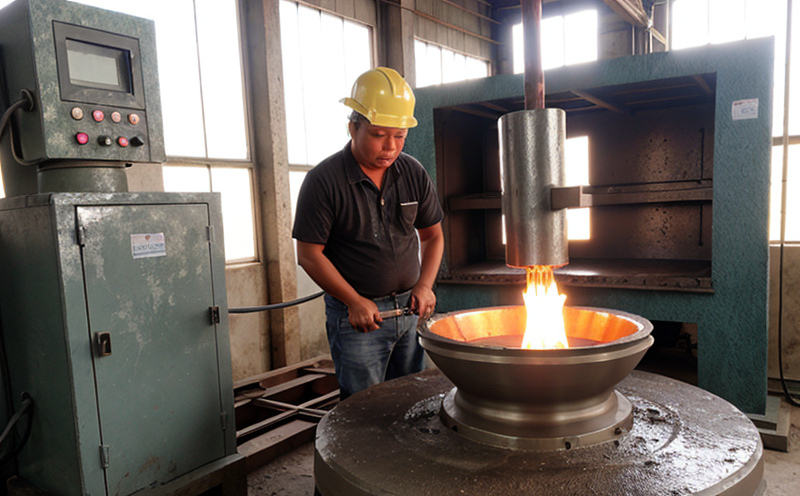ASTM B108 Aluminum Alloy Permanent Mold Casting Testing
The ASTM B108 standard specifies a detailed methodology for testing aluminum alloy permanent mold castings. This service is essential for ensuring the mechanical properties, dimensional accuracy, and metallurgical structure of aluminum alloys used in industrial manufacturing processes.
Aluminum alloys are widely used in various sectors due to their excellent combination of strength-to-weight ratio, corrosion resistance, and formability. Permanent mold casting, a process that uses reusable molds, is particularly suitable for producing complex shapes with precise dimensions. However, ensuring the quality of these castings through rigorous testing is critical to maintaining product reliability.
The ASTM B108 standard covers a range of mechanical tests including tensile, compressive, and shear strength measurements. These tests are conducted on samples that have been prepared according to the specified guidelines in the document. The test results provide critical insights into the performance characteristics of the aluminum alloy used.
Dimensional accuracy is another key aspect tested under ASTM B108. This involves measuring the dimensions of the castings against the nominal values defined by the design specifications. Any deviations from these nominal values can impact the functionality and compatibility of the component in the end product.
The metallurgical analysis conducted as part of this testing ensures that the aluminum alloy used meets the required chemical composition standards specified by ASTM B108. This includes checking for impurities, grain structure, and other microstructural features that can influence the performance of the casting.
Given the stringent requirements outlined in ASTM B108, this service is particularly beneficial for industries such as aerospace, automotive, and construction, where the integrity and reliability of aluminum alloy components are paramount. Ensuring compliance with these standards not only enhances product quality but also supports regulatory requirements and customer expectations.
Scope and Methodology
The ASTM B108 standard provides a comprehensive framework for testing aluminum alloy permanent mold castings. It covers various aspects including sample preparation, test procedures, and acceptance criteria. The scope of the service includes:
- Sample preparation according to ASTM B108 guidelines
- Conduction of mechanical tests such as tensile strength, compressive strength, and shear strength
- Dimensional accuracy assessment
- Metallurgical analysis including chemical composition checks
The methodology involves the use of precise instruments to ensure accurate measurement and analysis. This includes the use of tensile testing machines, micrometers for dimensional measurements, and optical microscopes for metallurgical examination.
| Parameter | Acceptance Criterion |
|---|---|
| Tensile Strength (ksi) | ≥ 45 ksi |
| Compressive Strength (ksi) | ≥ 60 ksi |
| Shear Strength (ksi) | ≥ 35 ksi |
| Dimensional Accuracy (%) | ≤ 2% |
Environmental and Sustainability Contributions
The ASTM B108 testing service plays a crucial role in promoting environmental sustainability by ensuring that aluminum alloys used in industrial manufacturing meet the highest quality standards. This not only enhances product reliability but also supports sustainable practices.
- Reduces waste and rework through accurate material selection
- Promotes recycling of high-quality materials
- Supports energy-efficient designs by ensuring the integrity of components
Use Cases and Application Examples
The ASTM B108 testing service finds application in various industries where aluminum alloy permanent mold castings are used. Some common use cases include:
- Aerospace industry for manufacturing lightweight yet durable components
- Automotive sector for producing high-strength, corrosion-resistant parts
- Construction industry to ensure the integrity of structural components
The table below provides specific examples and applications of ASTM B108 testing in different sectors:
| Sector | Application |
|---|---|
| Aerospace | Testing of engine components for high-strength, lightweight properties |
| Automotive | Evaluation of body panels and structural elements for crashworthiness |
| Construction | Assessment of structural components for load-bearing capacity |





